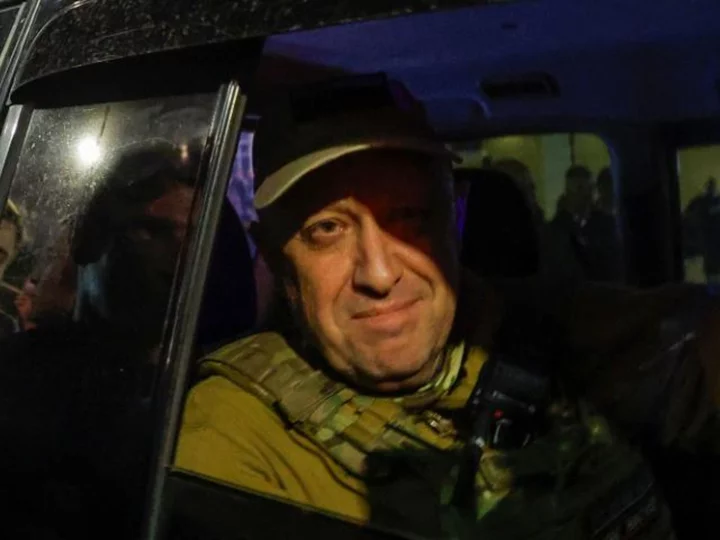Wagner mercenary boss Yevegeny Prigozhin over-reached and lost.
His hubris-fuelled insurrection failed through a combination of hot-headed ambition and his inability to read Putin's inner circle, of which he was a member, properly.
As one informed Moscow resident told me, the "system wasn't ready for the radical change" he wanted.
When he packed up his tanks and pulled out of the Russian military headquarters in Rostov-on-Don Saturday, well-wishers rushed up to say thank you.
His battle-hardened troops, like veteran actors at a curtain call after a long and tense 24-hour performance, waved goodbye to an apparently adoring audience.
Whether it had it all been theater, we may never know, but in Prigozhin's mind on Friday evening when he called his heavily armed forces to action on Russia's not Ukraine's streets, the time had come for him to take center stage.
For weeks, months even, he'd been arguing Russia's war in Ukraine was being badly and unnecessary fought by an elite who couldn't care less how many Russian lives were lost.
His message gained easy traction among Russians who understand that Putin and his coterie habitually lie and tolerate it only as long as their leader is strong and they enjoy stability.
It's a compact forged across generations: resistance to dictatorship is useless, just put your head down and survive.
Feud spills into the open
For months now, Prigozhin struck a chord with his charismatic and carefully choreographed front-line rants from Bakhmut where his fighters were dying in their hundreds so Putin could claim a tiny gain in his grindingly slow war in Ukraine.
To many, Prigozhin seemed brave. No Russian general was seen going so close to danger.
Prigozhin claimed his troops were being starved of ammunition by another of Putin's trusted inner circle, Russia's Defense Minister Sergey Shoigu.
The Wagner boss's obvious hatred of Shoigu had developed into a festering turf war over who would control Wagner. At stake were the vast money-making ventures Prigozhin developed and owned for the Kremlin in Africa and beyond.
Putin, whose hitherto iron-fisted rule relies on manipulating his inner circle's interests to keep them in line, should have shut the feud down sooner.
What the Russian public was hearing from Prigozhin, about how badly the war was going, was dangerous for Putin. The renegade mercenary boss's regular diatribes about a screwed-up, lying military leadership were seeds of dissent falling on fertile soil.
Prigozhin's miscalculation was how fertile that soil was, or more specifically which bits weren't.
Not only had his message been gaining traction with the public, he'd also been drawing support from top military ranks. At the end of April, he recruited Deputy Defense Minister Mikhail Mizintsev direct from the Kremlin.
Another top defense official, Sergey Surovkin, who for a while last year was put in charge of Russia's war in Ukraine, was a favorite of Prigozhin. "This is the only person with the star of the General of the Army who knows how to fight," Prigozhin said, at the height of his spat with the defense ministry in Moscow.
Rumors were the respect was reciprocated.
Around the same time Putin's massively powerful and vital ally Chechen leader Ramzan Kadyrov heaped praise on Prigozhin's troops. "The Wagner PMC has very good, courageous, necessary, necessary people," Kadyrov said.
As Prigozhin threatened to pull his forces from the front lines Kadyrov was trying to mediate. "If you stay with us," Kadyrov said, "I promise you that we will give you more, create better conditions, than you have today. We will try to make everything top notch for you."
At 9pm Friday night, Prigozhin claimed he met with Shoigu. What they discussed is still unknown. Shoigu left abruptly. Hours later, Prigozhin said he wasn't budging till Shoigu came back to talk, and in the meantime said he had dispatched a fighting force to Moscow.
'Treacherous' Prigozhin
Late Saturday morning as Prigozhin was still holed up In the Russian military headquarters in Rostov-on-Don, Kadyrov played kingmakers' hand: "What is happening is not an ultimatum to the Ministry of Defense. This is a challenge to the state, and against this challenge it is necessary to rally around the national leader," he declared.
He called Prigozhin "treacherous" and said he was sending his special forces to rout the mercenary boss. The walls were closing in.
Any thought Prigozhin might rally Russian army generals to his cause was evaporating too. Hours earlier, Surovkin, the only general he valued, released a video message telling him to "stop" and to "obey the will" of President Vladimir Putin.
Facing a potential Alamo, Prigozhin appeared to negotiate his way out on Saturday afternoon -- or at least he thought he did.
Prigozhin claimed he called off his march on Moscow to save "Russian blood", but the reality was that his neck was on the line.
Putin, fabled for rewarding loyalty and punishing the disloyal, had only hours earlier accused Prigozhin of "treason" and "armed rebellion." Now, he hid behind a diplomatic fig leaf, allowing his weak Belarus neighbor and supplicant, President Alexander Lukashenko, to announce an amnesty and sanctuary for Prigozhin.
But by Monday, that amnesty appeared to have evaporated. Russian state media said charges against Prigozhin had not been dropped, and since Belarus is an enfeebled client of Russia, it can surely offer little safety for Prigozhin.
If the Wagner boss does has any leverage left, it is bundled up in his shady diamond, gold and other dealings with Kremlin clients he helped recruit in Mali, Central African Republic, Sudan and Libya.
Such currency rarely holds its value long.
Prigozhin's world is a much smaller and more dangerous place now, but there can be little satisfaction for Putin in this as his empire is the most fragile it's been since he consolidated his power from a wholly different group of oligarchs two decades ago.

